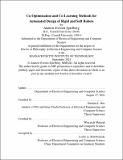| dc.description.abstract | Nature demonstrates an incredible diversity, capability, and complexity of life, with organisms that can robustly run, jump, and swim. Compared with their biological brethren, robotic "life" lacks rich dexterity or economy of motion, and their plainly simple designs indicate room for improvement. Unfortunately, a major barrier to creating similarly adept robots is the design process itself. Each aspect of robot design, including the (physical) body (e.g. actuation, sensing, geometry, materials) and the (cyber) brain (e.g. control, proprioception) is typically not integrated in a single design workflow, and a lack of fast, accurate, useful simulators leads to expensive, spiraling, hardware intensive iteration. This thesis introduces methods to marry all aspects of robot design into combined algorithms for holistic cyberphysical design. Core to this solution is co-optimization and co-learning methods which can simultaneously reason about different design domains and achieve locally optimal performance. This thesis further discusses considerations in modeling (via differentiable simulation) and realizability (through automated and semi-automated fabrication worfklows). We describe how this entire suite of capabilities from modeling to automated fabrication can be conceptualized in a complete end-to-end "robot design stack," providing full CAD-CAM computational design capabilities. We demonstrate these capabilities on for rigid, compliant, and soft robot design tasks, including locomotion, manipulation, and tactile sensing, and discuss the frontiers of this burgeoning field of computational robot design. | |
